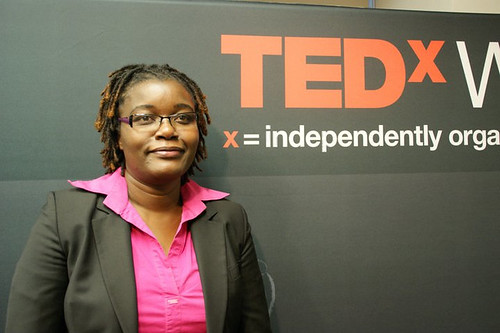ILRI's Jemimah Njuki gives a TEDxWashingtonCircle talk in December 2010 on gender and agricultural development (photo credit: IFPRI).
On 14 December 2010, Jemimah Njuki, a Kenyan sociologist and gender specialist at the International Livestock Research Institute (ILRI), gave a TEDxWashingtonCircle talk in Washington, DC, organized independently of TED events by the International Food Policy Research Institute. Njuki joined IFPRI's Agnes Quisumbing and Ruth Meinzen-Dick in a conversation, 'Igniting change: The gender match', arguing that gender remains the 'missing ingredient' in many development policies and programs.
In her talk, Njuki agrees that gender is still the missing link in agricultural development. But while gender mainstreaming has become 'a standard discourse' in agricultural development, she says, we have moved from gender-blind approaches to focusing exclusively on women. 'We have forgotten,' says Njuki, 'that women are situated in societies, that women live with men in their households, that women have to get power from those that are holding power within these communities.'
Focusing exclusively on women to advance their development is a mistake, says Njuki. A mistake for women. A mistake for men. A mistake for families. A mistake for their communities. A mistake for development projects aiming to empower women.
'Men have to be part of the solution', says Njuki. If we're going to put money in the pockets of women, she says, we have to put money also in the pockets of men. We won't elevate women without elevating whole households and communities.
Njuki provides a cautionary tale from Malawi, where a project to empower women through better marketing of their bean crops was soon taken over by men, disempowering women's involvement in, and benefits from, this traditionally female crop. She describes taking home that lesson in a subsequent project in Africa 'to change the face of women in agriculture' that made its starting point not problems (there were too many of them) but rather with opportunities—opportunities for both women and men. The project managed to improve food security and women's empowerment, but not at the expense of men.
Leadership and assertiveness training for women? Check. Training for women in group organization skills? Check. Gender training for households and villages? Check. But also—training in gender equality rather than 'women's empowerment'.
Watch this 19-minute TEDxTalk by ILRI's Jemimah Njiuki.


If there is one thing that TED teaches us is that even the smallest idea can have a profound impact on the world.